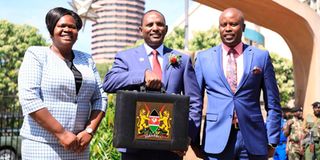MPs ‘not pressured’ by IMF, World Bank on Finance Bill

National Treasury Cabinet Secretary Ukur Yatani with National Assembly Budget committee chairman Kanini Kega and National Assembly’s Finance committee chairperson Gladys Wanga at Parliament Buildings for the unveiling the Sh3.3 trillion Budget on April 7.
A parliamentary committee has denied claims that it’s under pressure from the Bretton Woods institutions to reconsider its recommendations on the Finance Bill 2022.
In a report tabled in the National Assembly last week, the Finance and National Planning Committee rejected a majority of the proposals by the National Treasury to increase taxation to collect Sh51.6 billion to finance the Sh3.33 trillion budget for the 2022/23 financial year.
Chaired by Homa Bay Woman Rep Gladys Wanga, the committee argued that passing the Bill in its current state would increase taxation on basic commodities and make life unbearable for many Kenyans.
Ms Wanga’s statement came after claims that International Monetary Fund (IMF) and World Bank officials had held meetings with the committee to change its position on its recommendations on the Bill.
The Bill is passed every financial year to provide the legal framework for the financing of the country’s expenditure plans. Amendments to any Bill are made at the committee stage. The Bill had proposed to increase taxes on motorcycles, cosmetics and beauty products, jewellery, beer, wines and spirits, chocolate and bottled water.
The Bill proposed to raise duty on motorcycles to Sh13,403.64 per unit, up from Sh12,185.16, beer was to attract excise duty 10 per cent, spirits 20 per cent, glass 25 per cent (imported and locally made), alcohol advertising fees 15 per cent while cosmetic and beauty products 15 per cent.
The Bill further proposed to remove the tax relief that was afforded to the suppliers of maize flour and wheat flour that will now attract 16 per cent Value Added Tax (VAT).
The implication of the MPs’ recommendations is that the National Treasury will have to look for other means to finance the budget, which may include borrowing more from the local and foreign markets. Alternatively, the National Treasury may opt to reduce its expenditure plans through a supplementary budget. The National Treasury had proposed to retain the supply of cassava, maize and wheat flour in the VAT exemption schedule.
The committee, however, observed that the amendment would increase the price of flour by more than 10 per cent in weight. MPs rejected the proposal by stakeholders to delete the excise duty proposal on beauty products or retain the rate of excise duty at 10 per cent. They agreed with the proposal to raise excise duty to 15 per cent to discourage fake and counterfeit beauty products.
MPs also agreed with the Treasury to raise the excise duty on jewellery from 10 per cent to 15 per cent. The committee recommended that the excise rate for fruit juices — including grapes and vegetable juices, unfermented and not containing added spirit — be reduced to Sh13 a litre.
They rejected the increase in duty on beer, warning that it would increase uptake of illicit brew. The committee instead wants the excise rate of Sh121.85. “Excise rate of beer has been revised in the Finance Act 2021 and should therefore be given some time before review,” the committee stated.
MPs also recommended that the excise rate of wines be retained at Sh208.20 per litre against the proposals in the Bill, warning that increasing excise duty may lead to the uptake of illicit brews.
Their position was based on the fact that the excise rate of alcohol had been revised in the Finance Act of 2021 and should therefore be given sometime before review.
MPs adopted a proposal by the Kenya Association of Manufacturers to exclude the proposed excise duty on locally manufactured chocolate products to protect and allow the products to be competitive in the market.
They also recommended the proposal to remove 15 per cent excise duty on ice cream. They also observed that the imposition of excise duty on locally manufactured glass bottles would increase their prices and favour imports.
The committee also recommended that the proposed 15 per cent excise duty on fees charged on advertisement by TV and radio stations, print media on forms of betting and gaming be reduced to five per cent.
MPs noted that levying 15 per cent will be damaging to the businesses as they are overtaxed and that there are already regulations governing the advertising of gaming activities.





